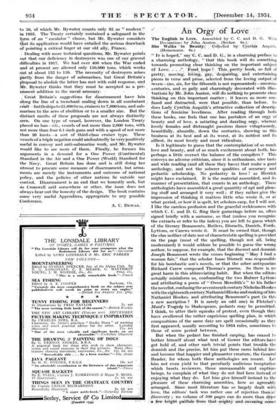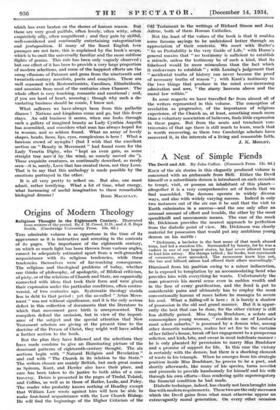An Orgy of Love
The English in Love. Assembled by C. C. and D. G. With Daeclations by John Austen. ,(Seeker. 634- ." IT is hoped," say*C. C. and D. G., in a charming preface to a charming anthology, " that this book will do something towards promoting clear thinking on the important subject Of Love: . .7' • Fond. hope:!- This, pretty :book, so full of pretty, moving, loving, gay, 'desPairing; and entertaining pieces in verse and prose, selected from the loving output' of seven—(no, six, for the fifteenth is net-represented)—amorous centuries, and so gaily and charmingly decorated with illus- trationa by Mr. 4ohn Austen, will do nothing-to promote clear thinking on this important matter ; it leaves us more con- fused and distracted, were that possible, than before. So does Lady Cynthia Asquith's attractive collection of descrip-
tions of feminineloveliness. After reading through both
these books, one feels that one has partaken of an orgy of beauty and of love, a satiating and dazzling orgy, whereat lovely females and distraught passions dance voluptuottsly, beautifully, absurdly, down the centuries, showing us this business at its best and at its worst, at its; noblest and its
silliest, its most lovely and most ridiculous.
Is it legitimate to guess that the contemplation-of so much love and beauty, and of so much excitement about both, hits perhaps a little overset the balance of the compilers ? This conveys no adverse criticism, since it is enthusiasm, nice taste and wide reading (and all these they have) that make a go4d anthology, and not the soberer qualities of accuracy and pedantic scholarship. No pedantry in love ! as Herrick might have exclaimed. It is the material assembled, and its
manner of presentation, that counts in _an anthology. These anthologists have assembled a great-quantity of apt and pleas- ing stuff and arranged it very well ; if they rather give the impression of thinking it matters little who wrote it, or at what period, or hovi it is spelt; let scholars carp, for I will not.
I like the careless profusion and the graceful recklessness with which C. C. and D. G. fling their garnerings before us, often
signed briefly with a surname, so that (unless you recognize the extracts or refer to-the index) you are left to guess which of the literary Beatunonts, Butlers, Disraelis, Daniels, Fords, Lyttons, or Carews wrote it. It must be owned that, though the clue neither of date nor of characteristic spelling is proVided On the page (most of the spelling, though not all, being modernized) it would seldom be possible to guess -the wrong author, to suppose, for example, that the discreet and donniSh Joseph Beaumont wrote the verses beginning " May I fm&a woman fair," that the scholar Isaac Disraeli was responsible for his bombastic son's novels, or that the sober. antiquarian Richard Carew composed Thomas's poems. So there is no great harm in this abbreviating habit. But when the editUrs
actually misinform us, confounding the two Bulwer Lyttons and 'attributing a poem of " Owen Meredith's 7 to his father the novelist, confusing the seventeenth century Nicholas Hookes with the eighteenth century Nathaniel Hooke and making of him Nathaniel Hookes, and attributing Beaumont's part (is this a new ascription ? It is surely an odd one) in Fletcher's Maid's Tragedy to Shakespeare, pedants may be permitted, I think, to utter their squeaks of protest, even though they have swallowed the rather capricious spelling plan, in which compositions of the same date are spelt occasionally as they first appeared, usually according to 1934 rules, sometimes to those of some period between. But when the pedant has finished carping, has ceased to bother himself about what text of Gower the editors have
got hold of, and other such trivial points that trouble the donnish and the precise, let him put these cares behind him and become that happier and pleasanter creature, the Geneial
Reader, for whom both these anthologies are meant. Let him not even yield to that peculiarly malicious temptation which besets reviewers, those unreasonable and captious beings, to complain of what they do not find here instead of enjoying what they do. Let him give himself instead to the Pleasure of these charming amenities, here so agreeably
arranged. Since most literature has so largely dealt with
love, the editors' task was rather one of rejection than'of discovery ; no volume of 500 pages can do -more than cliaw :a few -bright pailfuls from that-mighty -and-ravening ocean which has ever beaten on the shores of human reason. But these are very good pailfuls, often lovely, often witty, often exquisitely silly, often magnificent ; and they gain by skilful, well-considered and continually entertaining categorization and juxtaposition. If many of the finest. English love passages are not here, this, is explained by the book's scope, which is to omit the universally familiar and the more sublime flights of genius. This rule has been only vaguely observed ; but one effect of it has been to provide a very large proportion of modern selections, and some of the happiest efforts are the smug effusions of Patmore and gems from the nineteenth and twentieth-century novelists, poets and essayists. These are well seasoned with Restorationists, Carolines, Elizabethans, and amorists from most of the centuries since Chaucer. • The whole effect is very touching, romantic and emotional ; and, if you are hard of heart, amusing ; though why such a de-
vastating business should be comic, I know not. '
What sufferers we have always been from this pathetic disease ! Nations and kingdoms come and go, but this fever stays. An odd business it seems, when one looks through such a gallery of imagined beauty as Lady Cynthia Asquith has assembled, and considers what man has always hoped for in woman, and so seldom found. What an array of lovely shapes, heads, faces, lips, eyes, complexions is here That a luscious crowd of nymphs ! (but I wish that the excellent section on " Beauty in Movement " had found room for the Lady Venetia Eiigby, who "kept an 'even gate, as some streight tree mov'd by the wind, so comely moved she "). These exquisite creatures, so continually described, so rarely seen—it is, surely, Love that has created them, not they Love. That is to say that this anthology is made possible by the emotions portrayed in the other.
It is all very pretty to reflect on. But also, one must admit, rather terrifying. What a lot of time, what energy, what harnessing of useful imagination to these remarkable








































 Previous page
Previous page